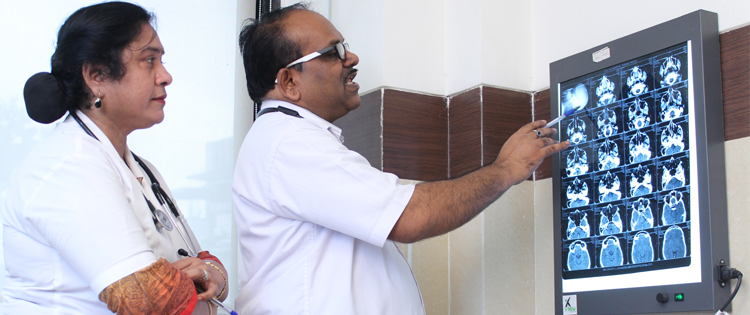Neurology Department of Lifeline Hospital is committed to integrating their exceptional medical expertise, technology, and innovation to offer best diagnosis and treatments for all diseases related to the central nervous system of the human body.
We have experienced neurologist and neurosurgeons to treat a broad range of neurological diseases like stroke, Parkinson’s disease, Spinal Cord Disorders, infections of the brain, and disorders related to the speech and languages.
Our neurosurgeon makes the thorough research and accurate assessment about the progress of the treatment.
What is Neurology?
Neurology is the healthcare specialty that deals with diseases of the nervous system. It covers the central and peripheral nervous systems and blood vessels, effector tissue or muscle. A neurologist is a specialized physician in diagnosing and treating these disorders.
What are the neurological disorders?
Neurological disorders are the most frightening illnesses of the brain, spine and the nerves of the human body. There are more than 600 disorders of the nervous system, such as brain tumors, epilepsy, Parkinson's disease, and stroke or frontotemporal dementia.
When to Seek Neurologist?
When you observe the various symptoms like paralysis, poor coordination, weakness in the muscles, seizures, loss of sensation, pain, confusion and changed levels of consciousness, then it is the right time to seek out the advice of a neurologist.
What are the Tests & procedures for Neurological diseases?
At Lifeline Hospital, our neurologist performs a neurological examination with the precise diagnosis. These may include
- Computerized Tomography (CT) scan
The technique comprises a series of X-rays to produce a detailed cross-sectional image of the brain.
- Magnetic resonance imaging (MRI)
MRI utilizes magnets and radio waves to deliver precise images of the brain. It is sensitive than CT scan and shows detailed changes in brain tissue.
- Blood tests
It is used to detect infections in the brain and spinal cord, disease of the bone marrow, injury to the blood vessels and poisons affecting the nervous system.
- Genetic testing of DNA:
We do this by extracting DNA from white cells to diagnose inherited neurological disorders. Spinal, and brain fluid testing- It is used to identify acute and chronic inflammation, meningitis and some unusual infections.
Key Treatments for Neurological diseases
We perform some of the significant treatments for neurological disorders.
- Brain mapping
It is suitable for brain tumors and epilepsy.
- Brain stimulation
It is helpful for Parkinson’s disease.
- 3D imaging
This technology helps in operating the brain and supports the better targeting. Also, it provides the precise access to the tumour.
- Gamma Knife
It is a machine that delivers a single, highly focused, and a heavy dose of radiation to the target site (abnormal blood vessel formations) without damaging the surrounding tissue.
Available Treatments
- Day care spine surgery
We use Minimal Invasive Spine Surgery (MISS) for effective spine surgery, without making the large surgical incisions. In this, we use specialized instruments (tubular retractors) to access the spine with small incisions. It causes minimal injury and negligible blood, low infection rate, less trauma to the body, less post-operative pain and quick recovery.
- Brain Surgery for Abnormal Blood Vessels
An abnormal collection of blood vessels with weak walls tend to bleed. Bleeding may lead, to stroke, persistent disability or death. Before proceeding to the surgery, our surgeon will have the CT scan or MRI to locate the AVM. Then operate complete abnormal blood vessels.
- Brain Tumour surgery
Surgery is the principal treatment for brain tumors. We treat benign tumors only with surgery, and malignant (cancerous) tumors with a combination of surgery and radiation therapy or chemotherapy.
- Burr hole drainage
It is a surgical procedure used to remove a blood clot present near the brain. In this procedure, a small perforation is prepared through the skull to suction out the blood and relieve pressure on the brain.
- Micro-neurosurgery
It is surgery performed utilizing an operating microscope. The primary objective of Neurosurgery is to treat the disease by maintaining the delicate functions of the brain intact. We perform micro-neurosurgeries by combining the latest microscopic techniques with the advanced and up-to-date technical resources.
- Neuro Angiography & Coiling of Aneurysms
Endovascular coiling aims to separate an aneurysm from the normal circulation without obstructing any small arteries present nearby the main vessel. It is a minimally invasive technique to access the aneurysm specifically during angiography.
Pre Treatment Instructions
- Do not carry valuables with you on the day of your operation.
- Bring someone to take care of you after surgery.
- Wear comfortable clothing.
- Remove glasses, contact lenses, dentures before surgery.
- Remove all jewellery before going for surgery.
- Take a regular shower before coming to the hospital.
- Eat light breakfast on the day before your operation.
- Do not drink any carbonated and alcoholic drinks for 24 hours before surgery.
- Do not eat anything at least 8 hours before the operation.
Post Treatment InstructionsPost Treatment Instructions
- After neurosurgery, your neuro physician will prescribe you with pain relieving medicines after discharge.
- Take that medicines as per described.
- After surgery, you will have one or more cuts on your head with staples or sutures (stitches). To remove these stitches, you need 7-8 days.
- You can have a head bath with a mild shampoo after 48 hours of surgery.
- Do not touch your incision for frequently.
- Do not swim for four weeks after surgery.
- Avoid having hair coloring until four weeks after surgery.
- Do not carry, push, or pull heavy weights for four weeks after surgery.
- Get out of bed and move around after surgery to avoid blood clot formation.
- Get proper rest and do not perform the rigorous activity.
If you want to know more, please feel free to contact us.



